moOde supports various audio sources. The most common used sources are (network) files and streaming (UPnP/Airplay/Bluetooth). Also alternative renders like Roon and LMS are available. But what if you want to capture external source like SPDIF or analog?
Maybe you just want to select you source digital, or stream it over the air or you just want to apply CamillaDSP to everything you play. Currently this isn’t supported out of the box with moOde. Luckily it can be accomplished with very small effort.
What will we do?
Sorry but this is going to be a long read:
- First we will collect some info about the available audio inputs.
- Next make a configuration which make dealing with the inputs easier.
- The main dish; how to use the inputs in a little bit fancier way with MPD/moOde.
- And for the hardcore audience; as dessert followed by an how to use the inputs with CamillaDSP directly.
None of the activities involves programming or changing code of moOde. Just changing setting and creating/update some configuration files.
Because we concentrate on the inputs this time, I assume that you already have setup a working audio output on your Pi with moOde. (At the moment of writing moOde 8.0.2 is used). And checked that CamillaDSP flat config works fine.
The used device
As example device we will use a MOTO AVB device, with the following input mapping:
- analog 1 input (device channels 0,1)
- analog 2 input (device channels 2,3)
- analog 3 input (device channels 4,5)
- toslink (device channels 6,7)
This mapping will differ per used device, with most MOTU devices you can setup a mapping in the settings of the device:
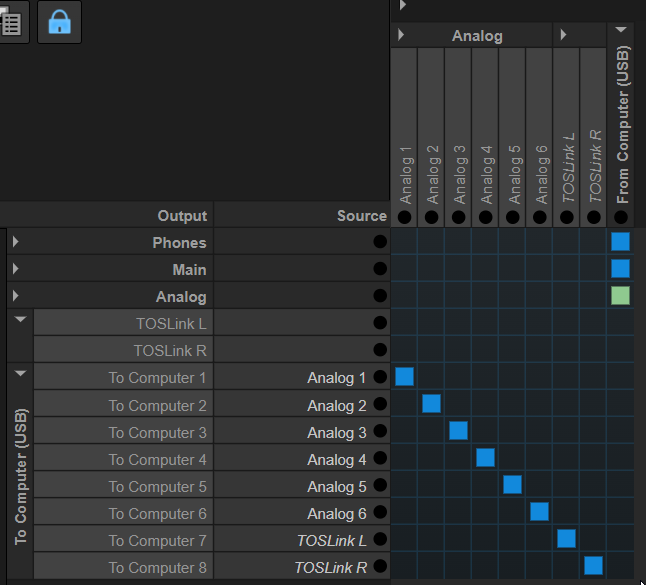
Disclaimer: I’m using this device because this is what I have at hand. It’s a fantastic device for what I normally use it for. But in the context of this blog, inputs, it (or the drivers) has some quirks. The UAC compatibility is not straight forward. And yes I also tried the Drumfix drivers from github. If you’re interested I have a prebuilt debian package for moOde available.
Device details
Before we start configuring the system, we need some details about the device. The same tools can also come in handy when solving problems.
List available usb devices
pi@moode:~ $ lsusb -tv
/: Bus 02.Port 1: Dev 1, Class=root_hub, Driver=xhci_hcd/4p, 5000M
ID 1d6b:0003 Linux Foundation 3.0 root hub
/: Bus 01.Port 1: Dev 1, Class=root_hub, Driver=xhci_hcd/1p, 480M
ID 1d6b:0002 Linux Foundation 2.0 root hub
|__ Port 1: Dev 2, If 0, Class=Hub, Driver=hub/4p, 480M
ID 2109:3431 VIA Labs, Inc. Hub
|__ Port 1: Dev 3, If 0, Class=Audio, Driver=snd-usb-audio, 480M
ID 07fd:0005 Mark of the Unicorn
|__ Port 1: Dev 3, If 1, Class=Audio, Driver=snd-usb-audio, 480M
ID 07fd:0005 Mark of the Unicorn
|__ Port 1: Dev 3, If 2, Class=Audio, Driver=snd-usb-audio, 480M
ID 07fd:0005 Mark of the Unicorn
|__ Port 1: Dev 3, If 3, Class=Audio, Driver=snd-usb-audio, 480M
ID 07fd:0005 Mark of the Unicorn
|__ Port 1: Dev 3, If 4, Class=Audio, Driver=snd-usb-audio, 480M
ID 07fd:0005 Mark of the Unicorn
|__ Port 1: Dev 3, If 5, Class=Vendor Specific Class, Driver=, 480M
ID 07fd:0005 Mark of the Unicorn
|__ Port 1: Dev 3, If 6, Class=Vendor Specific Class, Driver=, 480M
ID 07fd:0005 Mark of the Unicorn
|__ Port 1: Dev 3, If 7, Class=Vendor Specific Class, Driver=, 480M
ID 07fd:0005 Mark of the Unicorn
Notice the Class=audio with the Driver=snd-usb-audio (or motu when using the drumfix drivers); that is a UAC comptabile interface.
List the available capture devices
Lets see which capture devices are available with Alsa:
pi@moode:~ $ arecord -l **** List of CAPTURE Hardware Devices **** card 2: AVB [UltraLite AVB], device 0: USB Audio [USB Audio] Subdevices: 1/1 Subdevice #0: subdevice #0
From this output we learned that the capture device has card number 2.
Get details of the capture device
Now we know the card number we can dive deeper for more details:
pi@moode:~ $ arecord -D hw:2,0,0 --dump-hw-params Recording WAVE 'stdin' : Unsigned 8 bit, Rate 8000 Hz, Mono HW Params of device "hw:2,0,0": -------------------- ACCESS: MMAP_INTERLEAVED RW_INTERLEAVED FORMAT: S24_3LE SUBFORMAT: STD SAMPLE_BITS: 24 FRAME_BITS: 576 CHANNELS: 24 RATE: [44100 192000] PERIOD_TIME: [125 165103) PERIOD_SIZE: [6 7281] PERIOD_BYTES: [432 524232] PERIODS: [2 1024] BUFFER_TIME: (62 330227) BUFFER_SIZE: [12 14563] BUFFER_BYTES: [864 1048536] TICK_TIME: ALL --------------------
This time we learned:
- The sample format of the device is S24_3LE.
- It haves 24 input channels available.
- Is supports a sample rate from 44.1kHz till 192kHz.
Splitting the inputs
To make it easier to select the correct input, you can split up the input. Nice background article about how to do that is Audio multi-channel routing and mixing using alsalib.
For this we will create a file /etc/alsa/conf.d/motu_avb_inputs.conf, with the content below.
The name of the file can be anything, as long as it is put in the correct location.
pcm_slave.motu {
pcm "hw:2,0,0"
rate 44100
channels 24
}
pcm.ainput1 {
type dsnoop
ipc_key 12378
slave motu
bindings.0 0
bindings.1 1
}
pcm.ainput2 {
type dsnoop
ipc_key 12378
slave motu
bindings.0 2
bindings.1 3
}
pcm.ainput3 {
type dsnoop
ipc_key 12378
slave motu
bindings.0 4
bindings.1 5
}
pcm.toslink {
type dsnoop
ipc_key 12378
slave motu
bindings.0 6
bindings.1 7
}
If you copied the new configuration file to the correct location, you can check the availabity of the new named input devices
pi@moode:~ $ arecord -L ... ainput1 ainput2 ainput3 toslink ...
Next you can optional test if you can record from a specific input:
pi@moode:~ $ sudo arecord -D ainput1 -f S24_3LE -r 44100 -c 2 test.wav
(ctr+c will abort the recording)
And if you want to play it back (of course use your own device here):
aplay -D plughw:2,0 test.wav
If you came this far for own device, you will have now a working input(s). Next is to simultaneous capture and play it back.
Using inputs with MPD and the moOde user interface
In this mode the audio input is captured by MPD before handing over to CamillaDSP or audio device.
This is as simple as creating a playlist with the inputs mapping of above :
#ETM3U #EXTINF:-1, input 1 alsa://plug:ainput1?format=44100:24:2 #EXTINF:-1, input 2 alsa://plug:ainput2?format=44100:24:2 #EXTINF:-1, input 3 alsa://plug:ainput3?format=44100:24:2 #EXTINF:-1, toslink alsa://plug:toslink?format=44100:24:2
Place this file in the playlist directory of your moOde system:
- By using the network share
\\<moode host name or ip>\Playlists - Or place it directly local on the moode system at the location
/var/lib/mpd/playlists/.
In this case I named it motu.m3u.
Unfortunately the EXT information isn’t shown by MPD. It would nicer if the EXT info name was shown instead of the full alsa plugin config.
If it is possible to use the EXTINF, please let me know.
You can find back the playlist in library view of moOde:
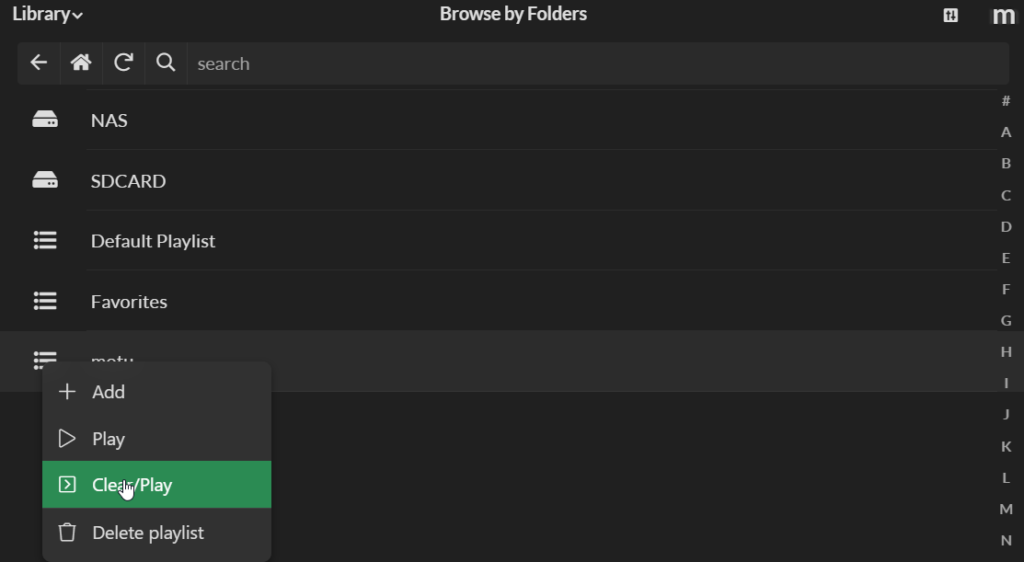
- Press on hamburger menu left from playlist name
- And press Add, Play or Clear/Play
Now the playlist is active of the main screen. You can select a different input by click it on in the current playqueue.
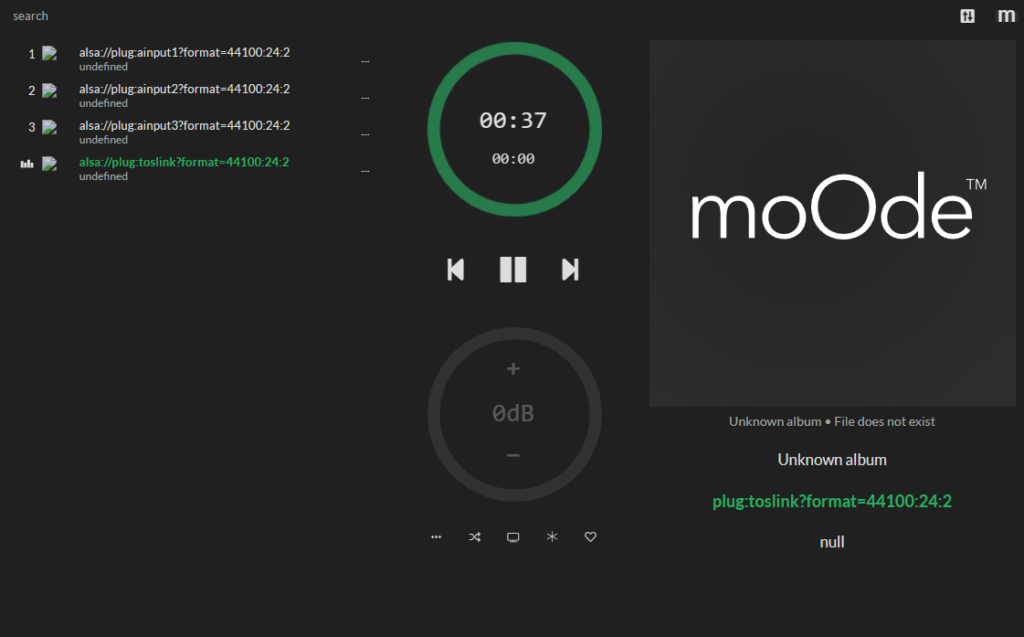
And of course proof that it is playing as expect from the audio information dialog (press the M in the upper right corner and select audio info):
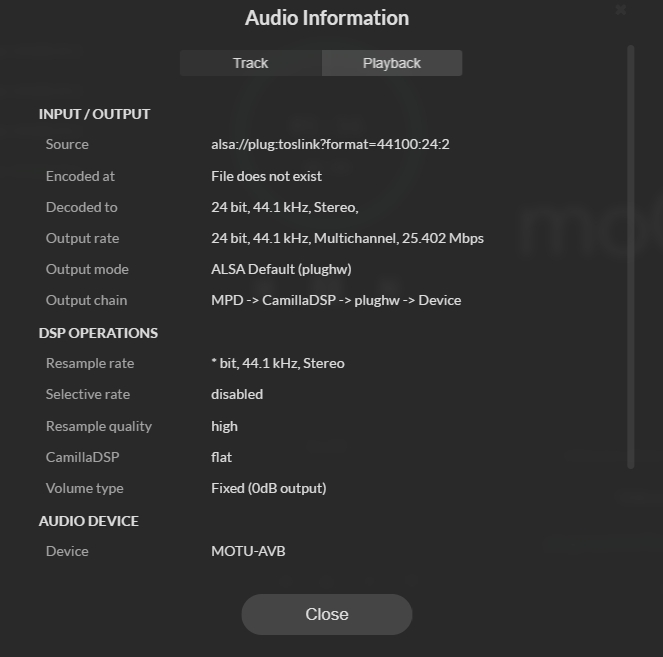
Below is a screenshot with the CPU load of simultaneous capture and playback on a Pi 4:

Despite the fact that the input selection is not fully integrated in moOde, that wasn’t so hard to do. I think we come a long way with the playlist.
Any DSP function like the Peq or CamillaDSP can be applied just like with regular MPD playback.
Using the inputs directly with CamillaDSP
This chapter isn’t needed unless you want to bypass MPD between the capture input and CamillaDSP. But it will be less flexible than the MPD solution.
If you just want to directly use the source with CamillaDSP you can arrange this from the CamillaDSP configuration file.
Only the default configuration of CamillaDSP with moOde doesn’t allow using the inputs from the CamillaDSP configuration file. This is because moOde is using the great alsa_cdsp module from scripple. This module makes automatic rate, format and channel switching possible with CamillaDSP.
But when alsa_cdsp is used alsa_cdsp also is in control of starting and stopping CamillaDSP, which is required when changing rate, format or channels.
To use the inputs directly with CamillaDSP we need to:
- Make sure moOde doesn’t alter the CamillaDSP configuration files any longer.
- CamillaDSP is start standalone (with a service script).
Downside is that as long as CamillaDSP standalone is used the output device, no other device can use the output device directly.
Copy a clean config:
- Select the configuration flat
- Press copy
- Named it cdsp_direct

Make it the active configuration:
- Select if as the active config
- Make sure default device is turned ON
- Press save
- Toggle default device OFF
- Press save again

Open the CamillaDSP pipeline editor:
- Toggle Expert mode to ON
- Toggle Status to ON
- Press OPEN
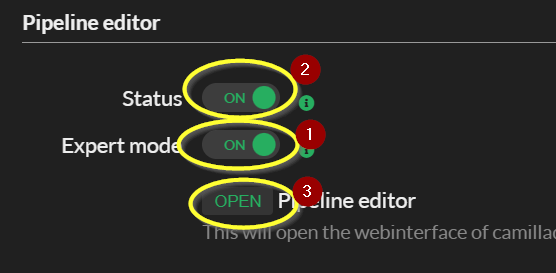
Set the capture device
- Change the capture device to alsa
- Set as device the desired input, in my case ainput1
- Step 3 is optional
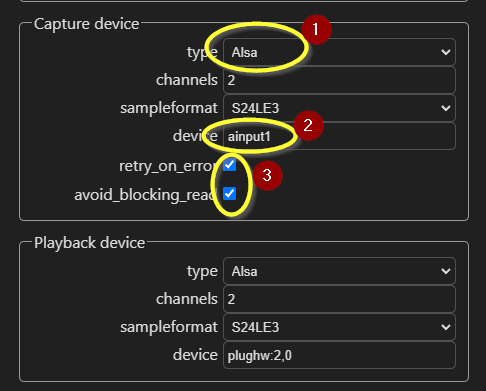
Start CamillaDSP standalone
Login to the terminal (with SSH or the onboard webterminal from moOde in system config)
Type in the following commands:
pi@moode:~ $ mpc stop pi@moode:~ $ wget https://raw.githubusercontent.com/moode-player/pkgbuild/main/packages/camilladsp/camilladsp.service pi@moode:~ $ sudo mv ./camilladsp.service /lib/systemd/system pi@moode:~ $ sudo systemctl start camilladsp pi@moode:~ $ sudo systemctl status camilladsp
If you are happy with the result, after testing, you can the command below to make sure CamillaDSP is started again after a boot:
pi@moode:~ $ sudo systemctl enable camilladsp
If you play music at input source, you should be able to see it at the volume bar in the pipeline editor:
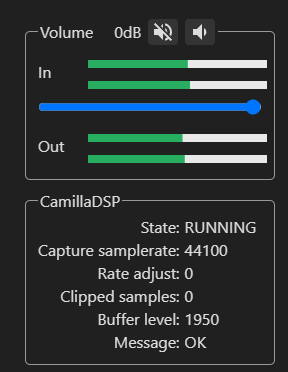


hi there,
so far moode has been updated to version 8.02 and it works great.
but i want to ask for help from you since i see your blog and you are also a big fan of moode while at the same time, you are good ate linux computing lanagues.
so i think you might be kind enough to help me out with your ability.
i love to use music format of the sacd-iso which is originated DSD files .
and Tim (owner of moode) refused to add sacd-iso mdp into the moode source becaue he think the sacd-iso is not updated from time to time.
the official mdp source is made by MAX keller mann in below link:
https://github.com/MaxKellermann/MPD
but i do know that there is a man who is updating the un-official MPD file with the sacd-iso in below link by ManIsiutkin who is also the same writher for the sacd-iso decoder for foobar, of which works great and world know. this is the source for his work:
http://git.musicpd.org/cgit/manisiutkin/mpd.git
so i ask for you help that would you help to teach me or post how to update (or replace) the existing mdp in Moode (any version will be fine) and since i am a noobie in linux lanuages, so a detail tutorial of post iwll be very kind of you.
i know it is an unreasonable request but just want to check if you can help.
thanks
by james
Hi, many thanks for this very useful post.
I am trying this to get phono input from my turntable, which has a Rega A2D mini preamp with a USB digital output, into Moode. This way I can control volume and use DRC via Camilla with my vinyl.
I’m almost there. I have successfully recorded and played back vinyl using the arecord and aplay commands above.
I have now created a playlist file, but when I try to start it, I get the error “Open MpdSock () failed” . Any suggestions for how to debug?
My playlist file has the contents –
#EXTINF:-1, input 1
alsa://plughw:1,0?format 44100:16:2
Many thanks
Paul Evans
Hi Paul,
Pm is under way.
Marcel
Hi Marcel,
I’m having issues as well with the same device. Can’t make it work.
My parameters are below. Can you help?
Recording WAVE ‘stdin’ : Unsigned 8 bit, Rate 8000 Hz, Mono
HW Params of device “hw:1,0,0”:
——————–
ACCESS: MMAP_INTERLEAVED RW_INTERLEAVED
FORMAT: S8 S16_LE
SUBFORMAT: STD
SAMPLE_BITS: [8 16]
FRAME_BITS: [8 32]
CHANNELS: [1 2]
RATE: [8000 48000]
PERIOD_TIME: [1000 1000000]
PERIOD_SIZE: [16 48000]
PERIOD_BYTES: [64 192000]
PERIODS: [2 1024]
BUFFER_TIME: (666 2000000]
BUFFER_SIZE: [32 96000]
BUFFER_BYTES: [64 384000]
TICK_TIME: ALL
——————–
arecord: set_params:1343: Sample format non available
Available formats:
– S8
– S16_LE
Hi,
I’m trying to use an analog stereo input with moode
to route the audio from an DVD/CD player
to a Behringer UCA222 usb dac.
It appears correctly with arecord -l
The sample format of the device is S16_LE
has two channels (stereo)
resolution 8-48 Khz
So I don’t need to split channels
only 1 input that will capture/play 2 channels stereo
How must be the config in alsa?
/etc/alsa/conf.d/inputs.conf
just this?
pcm_slave.ins {
pcm “hw:2,0,0”
rate 48000
channels 2
}
Thanks in advance,
Pedro
Hi Pedro,
In your case you can leave out the inputs.conf at all.
You can directly use the device in the playlist.
Marcel
Marcel, thank you for posting this project — really appreciate it. Do you know where can I find the command format guidelines for the alsa url used in the playlist? I’ve looked in both alsa and moode documentation and can’t find useful guidance.
Thanks!
Mike
Been trying this for a couple of days but can’t make it work.
I’m using an RPI4 and a usb Behringer sound card (UCA222).
The setup is as follows:
Turntable -> Preamp -> USB sound card -> RPI4 -> HiFiBerry AMP2 -> Speakers
Can you help me with this please?
No problem to provide some support, but please request support by starting a thread in the moode forum.
Fantastic write up.
I’m attempting to get sound into a stubborn Audi with no aux inputs from a 3.5mm source!
I’ve got it working but the latency is nearly 10 seconds…even after I reduce the Bluetooth Output buffer in Mo0de to 40ms. Believe it’s a buffer on the USB input. Any thoughts how I could improve this?
Thanks!
Hi,
Thanks for the wonderful post.
I am using moode audio 8.3.7 64bit version on raspberry pi 4 2gb variant.
I have connected an usb sound card which has one channel only.
I think i can use it without splitting channels as described in your post but i can’t find the syntax to add it to a playlist so i followed your tutorial.
I followed all the steps you have mentioned:
My usb sound card setup as per the post is as follows:
Content in /etc/alsa/conf.d/motu_avb_inputs.conf
pcm_slave.motu {
pcm “hw:2,0,0”
rate 44100
channels 1
}
pcm.ainput1 {
type dsnoop
ipc_key 12378
slave motu
bindings.0 0
}
Content in /var/lib/mpd/playlists/
alsa://plug:ainput1?format=44100:1:1
Now when i select motu.m3u from playlist and hit play, i get an error saying:
“Failed to decode alsa://plug:ainput1?format=44100:1:1; Invalid sample format: 1”
When i remove the “=” sign from Content in /var/lib/mpd/playlists/
alsa://plug:ainput1?format44100:1:1
Now when i select motu.m3u from playlist and hit play, i get an error saying:
“openMpdSock() failed”
Could you please help.
Satyam
10 DECEMBER 2023 AT 15:55
Your comment is awaiting moderation. This is a preview, your comment will be visible after it has been approved.
Hi,
Thanks for the wonderful post.
I am using moode audio 8.3.7 64bit version on raspberry pi 4 2gb variant.
I have connected an usb sound card which has one channel only.
I think i can use it without splitting channels as described in your post but i can’t find the syntax to add it to a playlist so i followed your tutorial.
I followed all the steps you have mentioned:
My usb sound card setup as per the post is as follows:
Content in /etc/alsa/conf.d/motu_avb_inputs.conf
pcm_slave.motu {
pcm “hw:2,0,0”
rate 44100
channels 1
}
pcm.ainput1 {
type dsnoop
ipc_key 12378
slave motu
bindings.0 0
}
Content in /var/lib/mpd/playlists/
alsa://plug:ainput1?format=44100:1:1
Now when i select motu.m3u from playlist and hit play, i get an error saying:
“Failed to decode alsa://plug:ainput1?format=44100:1:1; Invalid sample format: 1”
When i remove the “=” sign from Content in /var/lib/mpd/playlists/
alsa://plug:ainput1?format44100:1:1
Now when i select motu.m3u from playlist and hit play, i get an error saying:
“openMpdSock() failed”
Could you please help.
This is an excellent, incredibly detailed guide on wrangling multi-channel USB audio inputs with moOde! It’s like a deep-dive into the Alsa underworld, complete with arcane incantations for config files and manual commands. While the process is undeniably complex (fitting for a system aiming for audiophile perfection), it clearly demonstrates the power hidden beneath the moOde interfaces polished surface. It’s a bit like trying to fine-tune a Stradivarius – not for the faint of heart or those who prefer simple playlists! Highly appreciated for the effort.